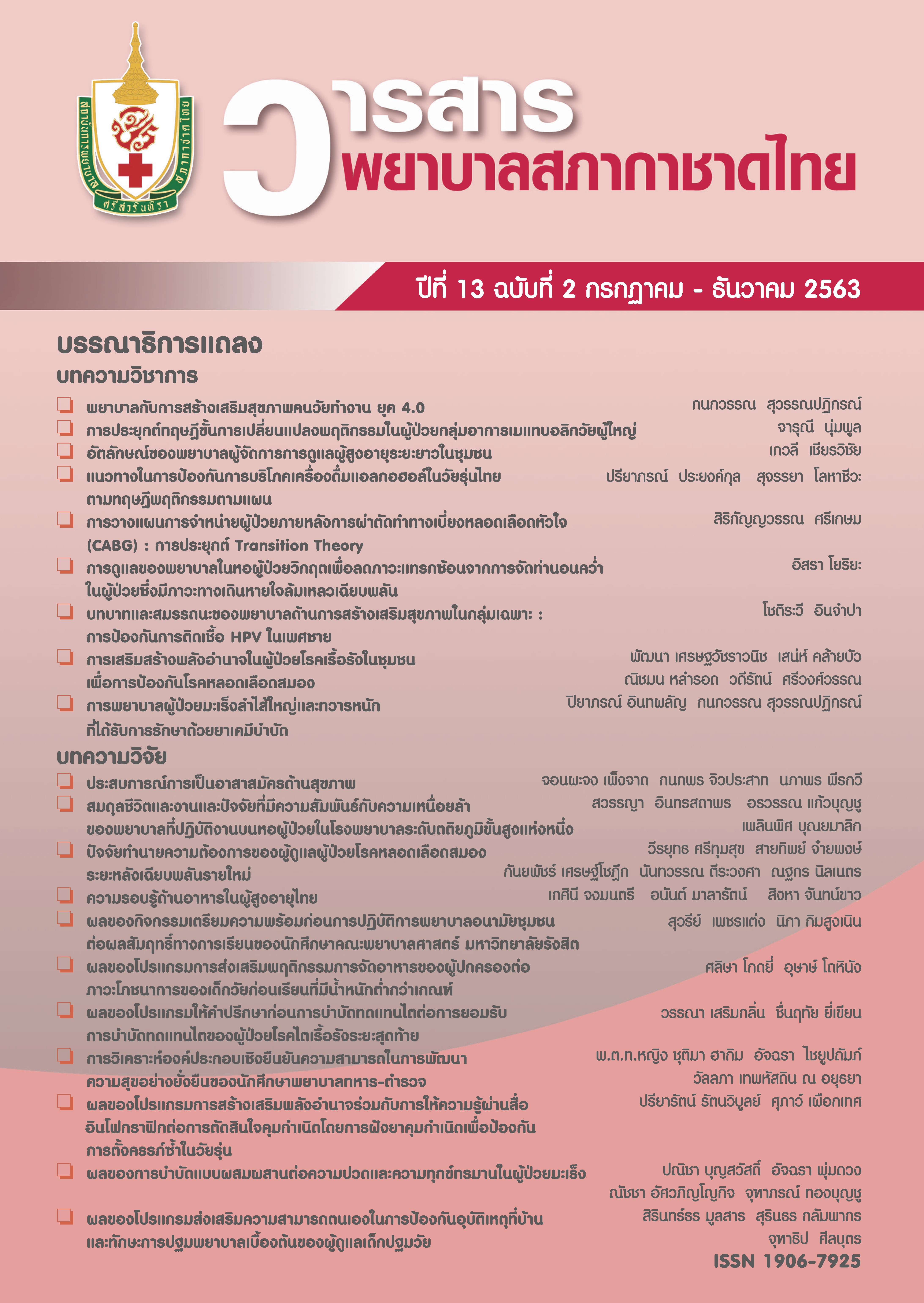Effects of Pre-Dialysis Counseling Program on Accepting Renal Replacement Therapy in End-Stage Renal Disease Patients
Keywords:
end stage renal disease, renal replacement therapy, pre-dialysis counseling program, chronic kidney disease, pre-dialysis educationAbstract
This was a quasi-experimental research with a two group post-test design to study the effects of the constructed pre-dialysis counseling program on accepting renal replacement therapy (RRT) in new cases of patients with ESRD at Queen Savang Vadhana Memorial Hospital from fiscal year 2018 to 2019. The participants were chosen using purposive sampling and were divided into two groups with 85 cases in each. The control group received pre-dialysis education using a flip chart while the experimental group received the constructed pre-dialysis counseling program. Data were analyzed using descriptive statistics, t-test, chi-square test, and binary logistic regression.
The results showed that the experimental group had a significantly greater rate of accepting RRT and had a significantly lesser rate of complications of CKD, lower number of emergency HD rates, and shorter length of stay of the first time of admission for RRT than those in the control group. For the experimental group, after receiving the constructed pre-dialysis counseling program, the scores of knowledge and attitude of CKD and RRT and attitudes related to this counseling program were significantly greater. In the control group, the factors predicting the acceptance of RRT comprised unemployment and anemia. The factors affected to not accepting RRT comprised company employees, and having an income of less than 15,000 baht per month. This equation showed the Nagelkerke R Square as 0.65.
References
2. Knauf F, Aronson PS. ESRD as a window into America’s cost crisis in health care. J Am Soc Nephrol 2009;20(10):2093-7.
3. Ingsathit A, Thakkinstian A, Chaiprasert A, Sangthawan P, Gojaseni P, Kiattisunthorn K, et al. Prevalence and risk factors of chronic kidney disease in the Thai adult population: Thai SEEK study. Nephrol Dial Transplant 2010;25(5):1567-75.
4. Thanakitcharu P. Current situation of chronic kidney disease in Thailand. Journal of the Department of Medical Services 2015;2(5):5-17. (in Thai)
5. Jesus NM, de Souza GF, Mendes-Rodrigues C, de Almeida Neto OP, Rodrigues DDM, Cunha CM. Quality of life of individuals with chronic kidney disease on dialysis. J Bras Nefrol 2019;41(3):364-74.
6. Apiwatnakorn A, Ruengorn C. Factors affecting rejection of dialysis in end-stage renal disease patients under universal health coverage in Uttaradit Province, Boromarajonani College of Nursing. Uttaradit Journal 2018;10(2):29-43. (in Thai)
7. Daengsibua A, Topark-ngarm A, Tatiyanupanwong S, Limwattananon C. Following up of stage 5 chronic kidney disease patients managed with non-dialytic treatment. Journal of Health Systems Research 2015;9(2):181-92. (in Thai)
8. Kaakinen P, Leena PP, Kyngas H, Kaariainen M.Counseling chronically ill adults in the healthcare setting: An intergrative literature review. J Nurs Educ Pract 2012;2(3):185-202.
9. Punjathumiarern N, Wanchai A, Kaewboonsert D. Treatment decision-making process withcontinuous ambulatory peritoneal dialysis of patients with end-stage kidney disease, Phayoa Hospital. Journal of Health Science Research 2019;13(2):1-10. (in Thai)
10. Rogers CR. Client-centered therapy; its current practice, implications, and theory. Boston: Houghton Mifflin; 1951.
11. Roger CR. On becoming a person. Boston: Houghton Mifflin; 1961.
12. Orem DE. Nursing: Concepts of Practice. 4th ed. St. Louis, MO: Mosby; 1991.
13. Kaewkungwal J, Singhasivanon P. Sample size in clinical research. In: Pitisuttithum P, Picheansoonthon C. Textbook of Clinical Research. Bangkok: Faculty of Tropical Medicine, Mahidol University; 2011. P.107-43. (in Thai)
14. Fungtrakoon S. Effect of DR. TITAN ANIMATION as a counseling aids on pre-dialysis (Diploma of the Thai Board of Family Medicine). Bangkok: The Royal College of Family Physicians of Thailand; 2015. (in Thai)
15. Kaewsrisang S, Sookprasert P, Sangchaisirisuk U. Model of information for patients with chronic kidney disease and their families in the treatment of renal replacement therapy Sawanpracharak Hospital, Nakhon Sawan Province. Sawanpracharak Medical Journal 2011;8(3):116-26. (in Thai)
16. Combes G, Sein K, Allen K. How does pre-dialysis education need to change? Findings from a qualitative study with staff and patients. BMC Nephrol 2017;18:334: 11 pages.
17. Tamura MK, Li S, Chen SC, Cavanaugh KL, Whaley-Connell AT, McCullough PA, et al. Educational programs improve the preparation for dialysis and survival of patients with chronic kidney disease. Kidney Int 2014;85(3):686-92.
18. de Maar JS, de Groot MAJ, Luik PT, Mui KW, Hagen EC. GUIDE, a structured pre-dialysis programme that increases the use of home dialysis. Clin Kidney J 2016;9(6):826–32.
19. White CA, Pilkey RM, Lam M, Holland DC. Pre-dialysis clinic attendance improves quality of life among hemodialysis patients. BMC Nephrol 2002;3:3.
Downloads
Published
Issue
Section
License
เนื้อหาบทความหรือข้อคิดเห็นต่างๆ ในวารสารพยาบาลสภากาชาดไทยนี้ เป็นความคิดเห็นของผู้เขียนบทความ ไม่ใช่ความเห็นของกองบรรณาธิการ หรือสถาบันการพยาบาลศรีสวรินทิรา สภากาชาดไทย






